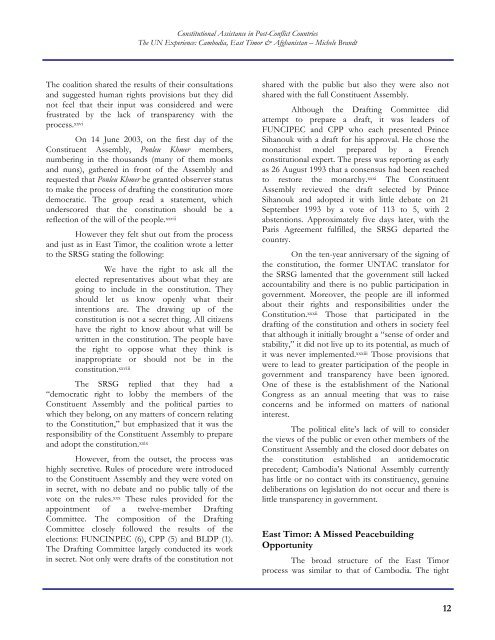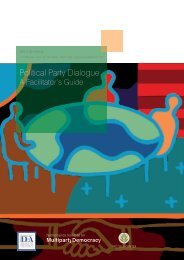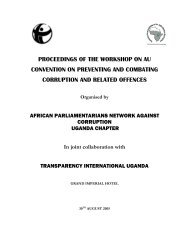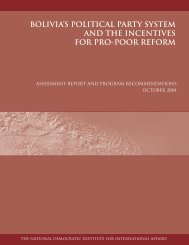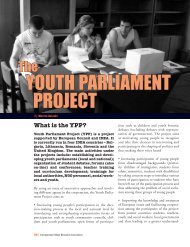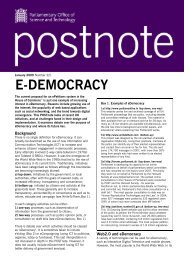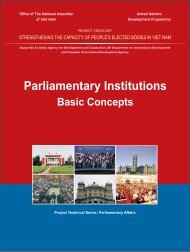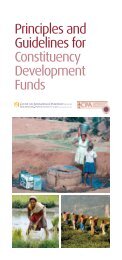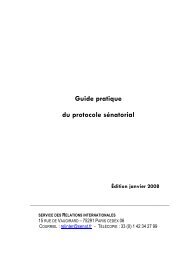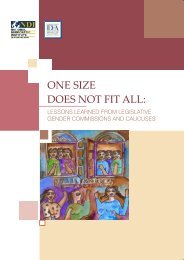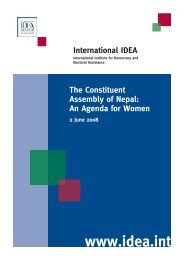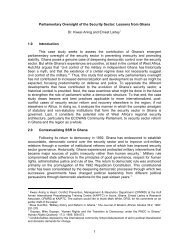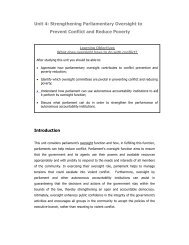Constitutional Assistance in Post-Conflict Countries The UN ...
Constitutional Assistance in Post-Conflict Countries The UN ...
Constitutional Assistance in Post-Conflict Countries The UN ...
Create successful ePaper yourself
Turn your PDF publications into a flip-book with our unique Google optimized e-Paper software.
<strong>Constitutional</strong> <strong>Assistance</strong> <strong>in</strong> <strong>Post</strong>-<strong>Conflict</strong> <strong>Countries</strong><strong>The</strong> <strong>UN</strong> Experience: Cambodia, East Timor & Afghanistan – Michele Brandt<strong>The</strong> coalition shared the results of their consultationsand suggested human rights provisions but they didnot feel that their <strong>in</strong>put was considered and werefrustrated by the lack of transparency with theprocess. xxviOn 14 June 2003, on the first day of theConstituent Assembly, Ponleu Khmer members,number<strong>in</strong>g <strong>in</strong> the thousands (many of them monksand nuns), gathered <strong>in</strong> front of the Assembly andrequested that Ponleu Khmer be granted observer statusto make the process of draft<strong>in</strong>g the constitution moredemocratic. <strong>The</strong> group read a statement, whichunderscored that the constitution should be areflection of the will of the people. xxviiHowever they felt shut out from the processand just as <strong>in</strong> East Timor, the coalition wrote a letterto the SRSG stat<strong>in</strong>g the follow<strong>in</strong>g:We have the right to ask all theelected representatives about what they arego<strong>in</strong>g to <strong>in</strong>clude <strong>in</strong> the constitution. <strong>The</strong>yshould let us know openly what their<strong>in</strong>tentions are. <strong>The</strong> draw<strong>in</strong>g up of theconstitution is not a secret th<strong>in</strong>g. All citizenshave the right to know about what will bewritten <strong>in</strong> the constitution. <strong>The</strong> people havethe right to oppose what they th<strong>in</strong>k is<strong>in</strong>appropriate or should not be <strong>in</strong> theconstitution. xxviii<strong>The</strong> SRSG replied that they had a“democratic right to lobby the members of theConstituent Assembly and the political parties towhich they belong, on any matters of concern relat<strong>in</strong>gto the Constitution,” but emphasized that it was theresponsibility of the Constituent Assembly to prepareand adopt the constitution. xxixHowever, from the outset, the process washighly secretive. Rules of procedure were <strong>in</strong>troducedto the Constituent Assembly and they were voted on<strong>in</strong> secret, with no debate and no public tally of thevote on the rules. xxx <strong>The</strong>se rules provided for theappo<strong>in</strong>tment of a twelve-member Draft<strong>in</strong>gCommittee. <strong>The</strong> composition of the Draft<strong>in</strong>gCommittee closely followed the results of theelections: F<strong>UN</strong>CINPEC (6), CPP (5) and BLDP (1).<strong>The</strong> Draft<strong>in</strong>g Committee largely conducted its work<strong>in</strong> secret. Not only were drafts of the constitution notshared with the public but also they were also notshared with the full Constituent Assembly.Although the Draft<strong>in</strong>g Committee didattempt to prepare a draft, it was leaders ofF<strong>UN</strong>CIPEC and CPP who each presented Pr<strong>in</strong>ceSihanouk with a draft for his approval. He chose themonarchist model prepared by a Frenchconstitutional expert. <strong>The</strong> press was report<strong>in</strong>g as earlyas 26 August 1993 that a consensus had been reachedto restore the monarchy. xxxi <strong>The</strong> ConstituentAssembly reviewed the draft selected by Pr<strong>in</strong>ceSihanouk and adopted it with little debate on 21September 1993 by a vote of 113 to 5, with 2abstentions. Approximately five days later, with theParis Agreement fulfilled, the SRSG departed thecountry.On the ten-year anniversary of the sign<strong>in</strong>g ofthe constitution, the former <strong>UN</strong>TAC translator forthe SRSG lamented that the government still lackedaccountability and there is no public participation <strong>in</strong>government. Moreover, the people are ill <strong>in</strong>formedabout their rights and responsibilities under theConstitution. xxxii Those that participated <strong>in</strong> thedraft<strong>in</strong>g of the constitution and others <strong>in</strong> society feelthat although it <strong>in</strong>itially brought a “sense of order andstability,” it did not live up to its potential, as much ofit was never implemented. xxxiii Those provisions thatwere to lead to greater participation of the people <strong>in</strong>government and transparency have been ignored.One of these is the establishment of the NationalCongress as an annual meet<strong>in</strong>g that was to raiseconcerns and be <strong>in</strong>formed on matters of national<strong>in</strong>terest.<strong>The</strong> political elite’s lack of will to considerthe views of the public or even other members of theConstituent Assembly and the closed door debates onthe constitution established an antidemocraticprecedent; Cambodia’s National Assembly currentlyhas little or no contact with its constituency, genu<strong>in</strong>edeliberations on legislation do not occur and there islittle transparency <strong>in</strong> government.East Timor: A Missed Peacebuild<strong>in</strong>gOpportunity<strong>The</strong> broad structure of the East Timorprocess was similar to that of Cambodia. <strong>The</strong> tight12


